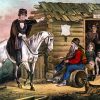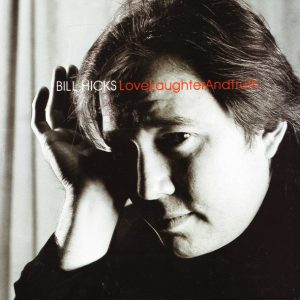calsfoundation@cals.org
Bill Hicks (1961–1994)
Bill Hicks was an American stand-up comedian and social critic in the tradition of Lenny Bruce and Richard Pryor. While he achieved only limited commercial success in his short lifetime, most of it in Great Britain, he is now regarded as one of the most influential American comedians of the twentieth century. With intellectual influences as wide-ranging as psychiatrist Carl Jung and linguist/political critic Noam Chomsky, Hicks married the middle-brow philosophical meandering of Woody Allen with the lacerating moral clarity of an Old Testament prophet. As a motion in the British House of Commons made on the tenth anniversary of his death declared, Hicks “may be mentioned as being worth[y] of inclusion with Lenny Bruce in any list of unflinching and painfully honest political philosophers.”
Bill Hicks was born William Melvin Hicks in Valdosta, Georgia, on December 16, 1961, to Jim and Mary Hicks. His father was an executive at General Motors, and his mother was a teacher; he had two older siblings. Hicks’s family lived in Florida, Alabama, and New Jersey before settling in Houston, Texas, when Bill was seven years old. By the time he was thirteen, Hicks was on stage in Houston nightclubs on open-mic nights, and by 1978, he had become a regular performing member of the Houston Comedy Workshop, often appearing with his friend Dwight Slade. In his senior year of high school, Hicks’s parents moved to Little Rock (Pulaski County), but he stayed in Houston to finish high school. Shortly after graduation in 1980, he moved to Los Angeles and embarked on a stand-up comedy career.
He quickly became a regular at the Comedy Store in Hollywood. For a time, he attended Los Angeles Community College. He also appeared in an unsuccessful pilot for a situation comedy before moving to Austin in 1982 and back to Houston the next year.
He briefly attended the University of Houston and began refining his act, which increasingly had a misanthropic, angry bent. He called himself “the Prince of Darkness,” and occasionally assumed the sexually charged alter ego “Goatboy.” After one show, he was famously attacked by two Vietnam veterans who, enraged by Hicks’s antipatriotic spirit, broke his leg.
Though Hicks was developing problems with drugs and alcohol, his career began to take off in 1984 when his friend Jay Leno arranged for him to appear on the talk show Late Night with David Letterman. He would go on to make a total of eleven appearances on Letterman’s show, though the show required Hicks to tone down his material. His last appearance—a few months before he died—was taped but never aired because CBS Practices and Standards found his material “unsuitable.” This “lost set,” which Hicks was convinced was censored because of his disparaging references to pro-life groups, ironically brought the comic more attention than any of his other appearances.
Hicks moved to New York City and quit using drugs, including alcohol, in 1988; the next year, he released his first video, Sane Man. Smoking remained his only vice—it became a linchpin of his act from then on. By 1989, he was performing as many as 300 club shows a year. His initial audio recording, Dangerous, was released in 1990, the same year he did the HBO special One Night Stand; it was followed by Relentless in 1992. A number of posthumous recordings have also been released, including Arizona Bay and Rant in E Minor, both in 1997, as well as Flying Saucer Tour, Vol. 1 (2002) and the two-disc Salvation (2005), a live concert given in Oxford, England.
Hicks’s comedy routines encompassed something of a Gnostic worldview, with him proclaiming the material world to be illusory (“It’s just a ride”) and calling upon his audience to transcend it; he excoriated fundamentalist religion, once saying, “Ever notice that people who believe in creationism look really unevolved?” He often wavered between compassion for humanity and utter contempt for it. Hicks is also renowned for his critiques of consumerist culture as well as a conspiracy-driven worldview that often manifested itself in jokes about the assassination of John F. Kennedy and the FBI’s raid of the Branch Davidian compound at Waco, Texas: “If the FBI’s motivating factor for busting down the Koresh compound was child abuse, how come we never see Bradley tanks smashing into Catholic churches?”
Diagnosed with pancreatic cancer on June 16, 1993, Hicks performed his final show on January 6, 1994, before a tiny crowd at Caroline’s in New York. He then moved back to his parents’ house in Little Rock to spend his final days surrounded by family. Hicks died in Little Rock on February 26, 1994. He was buried in the family plot in Leakesville, Mississippi. At the memorial service, Hicks’s brother, Steve, read a piece Hicks had written and requested be read: “I left in love, in laughter, and in truth, and wherever truth, love, and laughter abide, I am there in spirit.”
In July 2012, it was announced that actor Russell Crowe signed on to direct a movie about Hicks’s life.
For additional information:
Booth, Kevin, and Michael Bertin. Bill Hicks: Agent of Evolution. New York: Harper Collins, 2005.
Boulware, Jack. “Bill Hicks, the Black-humored Articulator of Doubt.” Salon.com. https://www.salon.com/2002/03/13/hicks_2/ (accessed February 9, 2023).
Lahr, John. “The Goat Boy Rises.” The New Yorker, November 1, 1993, 113–121. Online at http://www.newyorker.com/magazine/1993/11/01/the-goat-boy-rises (accessed February 9, 2023).
True, Cynthia. American Scream: The Bill Hicks Story. New York: Harper Collins, 2002.
Phillip Martin
Arkansas Democrat-Gazette
Staff of the Encyclopedia of Arkansas History & Culture
 Arts, Culture, and Entertainment
Arts, Culture, and Entertainment Divergent Prosperity and the Arc of Reform, 1968–2022
Divergent Prosperity and the Arc of Reform, 1968–2022 Bill Hicks
Bill Hicks 




Comments
No comments on this entry yet.